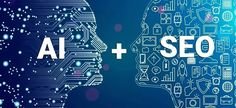Artificial Intelligence (AI) is revolutionizing digital marketing, especially in content creation and search engine optimization (SEO). AI-powered tools are enhancing efficiency, accuracy, and personalization, allowing businesses to create high-quality content and improve their SEO strategies. In this blog, we will explore how AI is transforming content creation and SEO, and how businesses can leverage it to stay ahead in 2025.

AI in Content Creation1. Automated Content Generation
AI-powered writing tools like OpenAI’s ChatGPT, Jasper, and Copy.ai allow marketers to generate high-quality content on demand.
Benefits:
- Faster blog and article creation
- Consistent brand tone across content
- Multilingual content generation for global audiences
Use Cases:
- Writing product descriptions for eCommerce
- Generating ad copy for PPC campaigns
- Creating captions and posts for social media
2. Enhanced Personalization
AI tracks user behavior, interests, and interaction history to deliver content tailored to each visitor.
Examples:
- Email marketing tools like ActiveCampaign and Mailchimp use AI to personalize subject lines, content, and send times.
- E-commerce platforms like Shopify and BigCommerce leverage AI to show personalized product recommendations.
Result: Higher engagement, longer session times, and improved conversion rates.
3. Content Optimization
AI tools like Surfer SEO, Clearscope, Frase, and MarketMuse help enhance content by aligning it with what’s ranking on Google.
Key Features:
- Semantic keyword suggestions
- Readability and structure feedback
- Competitor content comparison
Bonus: AI can also rewrite underperforming content to improve its SEO potential.
4. AI-Generated Visuals and Videos
AI tools simplify the creation of visual content — an essential part of digital marketing.
Popular Tools:
- Canva AI – Generate social media graphics with automated design assistance.
- Synthesia – Create AI-generated videos with avatars and voiceovers.
- Lumen5 – Turn blog posts into video summaries.
Emerging Trend: Use of text-to-image generators like DALL·E for blog illustrations or branding visuals.
5. AI-Powered Content Curation
Tools like BuzzSumo and Feedly AI help marketers discover trending topics and curate relevant content.
Applications:
- Sharing curated content on social media
- Using trending data for blog ideation
- Creating topic clusters for internal linking strategies
🔍 AI in SEO Strategy
1. AI-Powered Keyword Research
AI speeds up the research process by analyzing SERP data, competition, and user intent in real time.
Recommended Tools:
- Ahrefs, SEMrush, Ubersuggest – AI-enhanced insights for keyword difficulty, volume, and gaps.
- Twinword Ideas – Uses AI to group keywords by relevance and intent.
Pro Tip: Look for question-based keywords that align with voice search and featured snippets.
2. Predictive Analytics for SEO
AI doesn’t just analyze current performance — it predicts future trends.
Benefits:
- Anticipate changes in keyword demand
- Adjust strategies before algorithm updates hit
- Forecast seasonal trends for content planning
Tools like: Google Trends, BrightEdge, and CanIRank offer predictive capabilities to guide your SEO roadmap.
3. Voice Search Optimization
As smart speakers and virtual assistants rise, optimizing for conversational search becomes essential.
AI helps with:
- Identifying long-tail and question-based keywords
- Structuring content with natural language and FAQs
- Improving local SEO relevance
Tip: Add schema markup and target “near me” searches for better voice results.
4. AI-Driven Link Building
AI accelerates the link-building process by identifying opportunities and automating outreach.
What AI tools do:
- Analyze competitor backlink profiles
- Suggest high-authority linking sites
- Personalize outreach emails for better response rates
Top Tools: Postaga, Pitchbox, BuzzStream, and Respona integrate AI into outreach campaigns.
5. AI for Technical SEO
AI can quickly scan and resolve technical issues that affect your rankings.
Capabilities:
- Identifying broken links, redirects, and indexing issues
- Checking mobile-friendliness and page speed (Core Web Vitals)
- Auditing internal linking structures
Tools to Try: Screaming Frog, DeepCrawl, PageSpeed Insights, and SEO.ai.
📊 Bonus: AI-Powered Reporting & Automation
AI doesn’t stop at content and strategy—it enhances analytics and workflow automation too.
Tools & Features:
- Google Looker Studio + AI integrations: Create dashboards with predictive analytics.
- Zapier + AI: Automate repetitive SEO tasks like reporting, alerts, and data logging.
- ChatGPT + Sheets: Generate content outlines, keyword lists, and summaries within spreadsheets.
🧠 Final Thoughts: The Future of AI in Content & SEO
AI isn’t replacing marketers — it’s empowering them. By automating tedious tasks and offering intelligent insights, AI allows content creators and SEO professionals to focus on strategy, creativity, and growth.
✅ Use AI to scale smarter, not just faster.
✅ Combine tools with human creativity for best results.
✅ Stay up-to-date with new AI trends to maintain your competitive edge.
Conclusion
AI is transforming content creation and SEO by enhancing efficiency, accuracy, and personalization. Businesses that leverage AI-powered tools can improve their digital marketing efforts, create high-quality content, and enhance their SEO strategies for better search engine rankings. As the digital landscape evolves, staying updated with AI-driven advancements will be crucial for success. If you’re looking for expert guidance in AI-driven digital marketing, connect with the best digital marketing specialist today!
Visit My Website
For more insights and expert digital marketing solutions, visit jesteena.com . Stay ahead of the competition with AI-powered strategies and innovative marketing techniques!